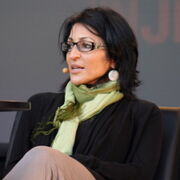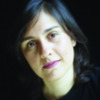Susan Abulhawa
Author of Mornings in Jenin
About the Author
Disambiguation Notice:
(yid) VIAF:169139702
Image credit: Susan Abulhawa at the Oslo Book Festival by Wikipedia user Decltype
Works by Susan Abulhawa
Associated Works
Will the Flower Slip Through the Asphalt? Writers Respond to Capitalist Climate Change (2017) — Contributor — 17 copies
Tagged
Common Knowledge
- Other names
- سوزان أبوالهوى
- Birthdate
- 1970-06-03
- Gender
- female
- Nationality
- USA
Palestine (birth) - Birthplace
- Palestine
- Places of residence
- Kuwait
Jordan
East Jerusalem
Pennsylvania, USA - Education
- University of South Carolina
- Occupations
- biomedical scientist
novelist
journalist
poet
essayist
activist - Organizations
- Playgrounds For Palestine (founder)
Palestine Writes festival (co-chair) - Agent
- Mark Miller (Mark Miller Management)
Anjali Singh (Ayesha Pande Literary) - Disambiguation notice
- VIAF:169139702
Members
Reviews
Mornings in Jenin by Susan Abulhawa was both a difficult book to read and a difficult book to write a review on. This was one of the most emotional reads I’ve had in a very long time. This is the story of the Palestine refugees told in a way that I personally had never known. This is a story of loss. The characters face the loss of their land, the loss of their dignity and the loss of their lives. The author opened my eyes to an event that has been on the world stage for a generation, yet show more one I really knew very little about.
The story of one Palestinian family from the 1940’s through to 2003 was a story of hardship, war and hatred. I was surprised and angry to read of such horrible acts that were committed by the same people who were mistreated and murdered by the Nazis. I know this book is probably more than a little one-sided and I need to balance my views by reading something from the Israeli point of view, but the message I take from Mornings In Jenin is that violence begets violence in a never ending cycle.
Both heart and gut-wrenching, Mornings In Jenin is a powerful read that resonated with me and left me feeling a sense of both loss and guilt. A moving story that takes one behind the headlines and gives us a personal look at the cost of disassembling a nation. show less
The story of one Palestinian family from the 1940’s through to 2003 was a story of hardship, war and hatred. I was surprised and angry to read of such horrible acts that were committed by the same people who were mistreated and murdered by the Nazis. I know this book is probably more than a little one-sided and I need to balance my views by reading something from the Israeli point of view, but the message I take from Mornings In Jenin is that violence begets violence in a never ending cycle.
Both heart and gut-wrenching, Mornings In Jenin is a powerful read that resonated with me and left me feeling a sense of both loss and guilt. A moving story that takes one behind the headlines and gives us a personal look at the cost of disassembling a nation. show less
Bellissimo e indimenticabile.
Leggere questo libro è stata un'esperienza incredibile sotto tutti i punti di vista e mi ha colpito nel profondo come non avrei mai pensato possibile.
È il racconto delle vicissitudini di quattro generazioni di una famiglia araba, gli Abulheja, narrate a partire dal 1948 in parallelo alla vera storia della Palestina, dal momento in cui verranno costretti con la forza ad abbandonare la loro casa ad ‘Ain Hod per essere trasferiti nel campo profughi di Jenin. show more
Un racconto duro e straziante ma al tempo stesso dolce, tenero e nostalgico, scevro comunque da qualsiasi acrimonia e recriminazione ma che ti fa entrare a viva forza in una realtà terribile e difficilissima, finora solo immaginata, ma che adesso queste parole hanno invece reso quasi tangibile.
Ci sono pagine che non potrò dimenticare, che ho letto con difficoltà perché la commozione e quello che sentivo mi impedivano di andare avanti, ci sono immagini che si sono create nella mia mente che non si cancelleranno, ci sono parole e frasi lette che risveglieranno ricordi e c'è la convinzione che quello che viene narrato è la realtà di quanto è successo. E poi ci sono le mille domanda che sorgono spontanee durante la lettura, una su tutte continua rigirare nella mia testa: ma com’è possibile che persone che hanno subito l’infamia dell’Olocausto possano dimenticare così in fretta quello che hanno subito e passare senza alcuna remora dal ruolo di vittime a quello di torturatori? La mente umana è così facile a dimenticare le sofferenze pur di raggiungere un fine, peraltro, in questo caso, alquanto discutibile nella sua legittimità?
Un libro che, oserei dire, andrebbe letto obbligatoriamente anche solo per farci capire quanto grande è la fortuna di nascere in un posto piuttosto che in un altro. show less
Leggere questo libro è stata un'esperienza incredibile sotto tutti i punti di vista e mi ha colpito nel profondo come non avrei mai pensato possibile.
È il racconto delle vicissitudini di quattro generazioni di una famiglia araba, gli Abulheja, narrate a partire dal 1948 in parallelo alla vera storia della Palestina, dal momento in cui verranno costretti con la forza ad abbandonare la loro casa ad ‘Ain Hod per essere trasferiti nel campo profughi di Jenin. show more
Un racconto duro e straziante ma al tempo stesso dolce, tenero e nostalgico, scevro comunque da qualsiasi acrimonia e recriminazione ma che ti fa entrare a viva forza in una realtà terribile e difficilissima, finora solo immaginata, ma che adesso queste parole hanno invece reso quasi tangibile.
Ci sono pagine che non potrò dimenticare, che ho letto con difficoltà perché la commozione e quello che sentivo mi impedivano di andare avanti, ci sono immagini che si sono create nella mia mente che non si cancelleranno, ci sono parole e frasi lette che risveglieranno ricordi e c'è la convinzione che quello che viene narrato è la realtà di quanto è successo. E poi ci sono le mille domanda che sorgono spontanee durante la lettura, una su tutte continua rigirare nella mia testa: ma com’è possibile che persone che hanno subito l’infamia dell’Olocausto possano dimenticare così in fretta quello che hanno subito e passare senza alcuna remora dal ruolo di vittime a quello di torturatori? La mente umana è così facile a dimenticare le sofferenze pur di raggiungere un fine, peraltro, in questo caso, alquanto discutibile nella sua legittimità?
Un libro che, oserei dire, andrebbe letto obbligatoriamente anche solo per farci capire quanto grande è la fortuna di nascere in un posto piuttosto che in un altro. show less
A rarely told Palestinian story (though perhaps more of their stories have been told since this was written). Heartbreaking on two levels especially, what these people experienced, and that they experienced it at the hands of people who one would hope and wish had kept bloodless hands. There is no denial in this novel that the Palestinians have blood on their hands too.
Abulhawa witnessed some of these events, and witnessed the denial of them by the UN and others. Knowing there would be show more denial of the contents of her novel, she quoted from the works of respected historians in a few areas. But this is a novel, a story of one family and their neighbours and friends.
It wrung my heart at the end when one young Palestinian is given a visa to study in the US, and writes home to say that he can't believe what life is like living somewhere there is no war. At the current time, we too should be remembering this. But then there is always war somewhere, and many of those wars go unacknowledged by those of us in safety. show less
Abulhawa witnessed some of these events, and witnessed the denial of them by the UN and others. Knowing there would be show more denial of the contents of her novel, she quoted from the works of respected historians in a few areas. But this is a novel, a story of one family and their neighbours and friends.
It wrung my heart at the end when one young Palestinian is given a visa to study in the US, and writes home to say that he can't believe what life is like living somewhere there is no war. At the current time, we too should be remembering this. But then there is always war somewhere, and many of those wars go unacknowledged by those of us in safety. show less
This is the story of several generations of a Palestinian family, told from the perspective of a woman born in the Jenin refugee camp in 1955. Existence is precarious, and at times there seems to be enough loss to shatter any threads of hope, and yet the family soldiers on.
When I read the book, I intended to take some time to think about what I'd read before writing a review. Days turned into weeks, and weeks turned into months, and while I regret not sitting down to put thoughts into words show more sooner, the very fact that certain images and emotions evoked by this novel feel almost as strong now as they did when I turned the last page... well, that tells me that this is a book that makes a real difference in how we perceive the Palestinian-Israeli conflict of the time.
Going into this novel, I didn't know much about the conflict, and after reading it, I find myself wanting to learn more -- from both sides. I've since heard that the travesties of Jenin caused the Israeli army to approach warfare differently (allowing people to leave before bombing villages, by letting people know a few days in advance where they were targeting)... so as horrifying as the things were that happened here, people learned from it and changed their actions because of it.
But back to the novel. You can't read this novel quickly, because it grips your heart and will cause you to ache for the characters inside. Some sections will require large wads of tissues, and you may need to walk away for a bit -- the images can become that horrifying, the loss that deep.
In the end, it's a novel from a rare perspective, and the author has done an incredible job, helping us see this conflict through fresh eyes. If it isn't on your reading list, it should be. Then you should pass it on to others, so they too can understand what happened in Jenin. show less
When I read the book, I intended to take some time to think about what I'd read before writing a review. Days turned into weeks, and weeks turned into months, and while I regret not sitting down to put thoughts into words show more sooner, the very fact that certain images and emotions evoked by this novel feel almost as strong now as they did when I turned the last page... well, that tells me that this is a book that makes a real difference in how we perceive the Palestinian-Israeli conflict of the time.
Going into this novel, I didn't know much about the conflict, and after reading it, I find myself wanting to learn more -- from both sides. I've since heard that the travesties of Jenin caused the Israeli army to approach warfare differently (allowing people to leave before bombing villages, by letting people know a few days in advance where they were targeting)... so as horrifying as the things were that happened here, people learned from it and changed their actions because of it.
But back to the novel. You can't read this novel quickly, because it grips your heart and will cause you to ache for the characters inside. Some sections will require large wads of tissues, and you may need to walk away for a bit -- the images can become that horrifying, the loss that deep.
In the end, it's a novel from a rare perspective, and the author has done an incredible job, helping us see this conflict through fresh eyes. If it isn't on your reading list, it should be. Then you should pass it on to others, so they too can understand what happened in Jenin. show less
Lists
Awards
You May Also Like
Associated Authors
Statistics
- Works
- 4
- Also by
- 1
- Members
- 1,863
- Popularity
- #13,816
- Rating
- 4.0
- Reviews
- 102
- ISBNs
- 111
- Languages
- 17
- Favorited
- 4
Charts & Graphs
Loading






















